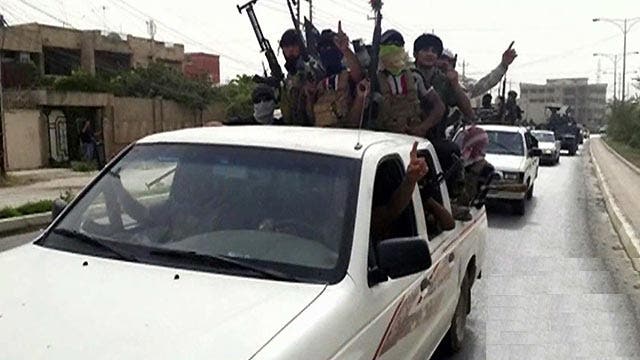ISIS rising: Who are insurgents on the march in Iraq?
Jennifer Griffin reports from the Pentagon
Long before it looted the Iraqi central bank in Mosul of $429 million, the Islamic State in Iraq and the Levant/Syria (ISIS) was well-funded in its quest to establish a Shariah caliphate, thanks to a raging criminal enterprise of extortion, bank robbery and petty theft, as well as donations from well-heeled sponsors throughout the Arab world, according to experts.
The latest payday — gained when the jihadist group led by Abu Bakr al-Baghdadi overran Iraq's second largest city and emptied the vaults of cash and gold bullion — swelled already healthy coffers and made ISIS, by some estimations, the world's richest terrorist organization. The group also seized U.S.-made tanks, Blackhawk helicopters, cargo planes and an unknown quantity of guns, all part of a $14 billion arsenal the U.S. sold or donated to the beleaguered Iraqi security forces.
The money and weapons are already helping ISIS in its ferocious bid to carve out a nation governed by strict and merciless Shariah law in northern Iraq and northwestern Syria. The group already sees itself as an independent state with large swaths of the two battle-scarred nations, areas it now controls and is bent on expanding. The "Levant" incorporated into the group's name historically refers to an eastern Mediterranean area that also includes parts of Lebanon, Israel, Jordan and Cypus, though it's unclear exactly what territory the organization has designs on.
[pullquote]
Aron Lund, a Stockholm-based Middle East expert and author of two books on Syrian militias and opposition politics, said ISIS has long gotten funding from ideological sympathizers throughout the wider region. They also enriched themselves after wading into Syria's bloody civil war, seizing territory including oil fields and setting up border checkpoints where they make truckers pay tolls, he said.
But much of their funding comes from what they consider "taxes and voluntary contributions," but others likely consider extortion and protection money, Lund said.
"As they see it, they're a state and so they're entitled to tax the population in accordance with Islamic law and to use resources for the common good as long as they don't infringe on property protections specified in the Quran," Lund told FoxNews.com. "And by the common good, they mean their war."
Experts said it's impossible to gauge how many fighters ISIS counts, but as they roll through Iraq, terrorizing and pillaging the war-torn nation, the numbers are swelling. Lund said other Sunni rebel groups, alienated by Baghdad's refusal to include them in the mainly Shi'ite government, are joining. They likely don't pay their fighters wages, but they do need money to fund their metastasizing operation.
"When you have volunteer fighters who work for free and live ascetically, and you plunder weapons and ammunition out of government stockpiles, that cuts down on costs pretty dramatically," Lund said. "But they still have expenses, of course, both military and civilian, including lots of local charity projects to win hearts and minds where they've seized control."
Money trickles in to ISIS accounts from sympathizing Sunnis in Saudi Arabia, Qatar and Kuwait, according to Jonathan Schanzer, a former terrorism finance analyst at the U.S. Department of the Treasury and currently vice president of research at Foundation for Defense of Democracies.
"In some cases, there may even be funds originating from shadowy Al Qaeda figures inside Iran, he said. "This is complicated, to put it mildly.
"Apart from this traditional patron-client model, we also continue to see small-time criminal activity, including petty crimes and shakedowns where ISIS operates," Schanzer added.
By some estimates, looting the national bank in Mosul made ISIS the wealthiest terrorist organization in the world. The website MoneyJihad estimates that the Taliban has between $70 million and $400 million under its control, while groups like Hezbollah, Hamas and Al Qaeda operate on far less. British-based terrorism blogger Brown Moses observed that ISIS' bank haul could "buy a whole lot of jihad."
"For example, with $425 million, ISIS could pay 60,000 fighters around $600 a month for a year," Brown Moses tweeted.
The entire cost to Al Qaeda of the 9/11 attacks has been estimated at less than $30 million. With plenty of cash and their ranks growing, ISIS is poised to expand the territory it already controls, from Raqqah, Syria, to the west to Jalula, Iraq, to the east.
ISIS was known as Al Qaeda in Iraq until 2006, when it rebranded itself as ISIS. Its popularity grew in part out of opposition to the presence of U.S. forces, then swelled as the split between the Sunni sect of former Iraqi President Saddam Hussein clashed with the Shi'ite administration led by current Prime Minister Nuri al-Maliki. Abu Bakr al Baghdadi became the organization's leader in 2010 after founder Abu Omar al Baghdadi was killed in a joint U.S.-Iraqi operation.

